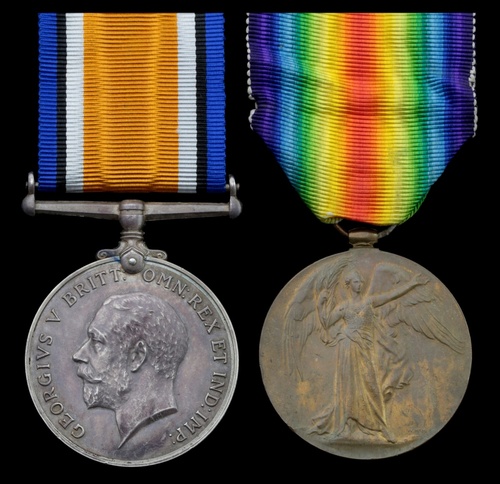
Auction: 22133 - Orders, Decorations and Medals - e-Auction
Lot: 656
Pair: Major W. St. John-Spencer, 9th (Service) Battalion, East Surrey Regiment, late Thorneycroft’s Mounted Infantry, a veteran of the North-West Frontier and the Boer War he was wounded eight times and invalided out of the Army in 1916
British War and Victory Medals (Major W. St. John-Spencer.), good very fine (2)
William St. John-Spencer was born in 1876 and served during the Boer War in South Africa as a Lieutenant in Thorneycroft’s Mounted infantry (Q.S.A. with 3 clasps and K.S.A. with 2 clasps). With the onset of the Great War in 1914 he was a Lieutenant on the Territorial Force General List (Poplar Battalion, National Reserve) and he was appointed Temporary Captain in the 12th (Bermondsey) Battalion, East Surrey Regiment on 12 July 1915.
St. John-Spencer served during the Great War on the Western Front in the rank of Temporary Major as second in command of the 9th (Service) Battalion, East Surrey Regiment from 28 August 1916, and was invalided to England on 18 November 1916. Admitted to Mill Bank Hospital, London with a head wound on 21 November 1916, he was discharged 1 month later with permanent injuries.
Following his death in 1937, a number of newspaper articles and obituaries stated that Major St. John-Spencer had been aide-de-camp to H.M. King George VI when he was Duke of York and that he had been wounded eight times in all throughout his service in the Boer War, the Great War and on the North-West Frontier of India.
His memory of the Great War was published in the 500 Best Cockney War Stories:
'The Colonel of the Regiment, gifted with the resonant voice of a dare-devil leader, was highly esteemed for his rigid sense of duty, especially in the presence of the enemy.
The Germans had been troubling us a lot with gas, and this kept everyone on the qui vive.
Accompanied by the Colonel, the Divisional Commander was making his usual inspection of the front line intent on the alertness of sentries.
In one fire-bay the Colonel stopped to give instructions regarding a ventilating machine which had been used to keep the trench clear of gas after each attack.
Meanwhile the General moved on towards the other end of the fire-bay, where the sentry, fresh out from the reserve battalion recruited in Bermondsey, stood with his eyes glued to the periscope.
A natural impulse of the General as he noticed the weather-vane on the parapet was to test the sentry's intelligence on "gas attack by the enemy," so as he approached the soldier he addressed him in a genial and confiding manner: "Well, my lad, and how's the wind blowing this morning?"
Welcoming a little respite, as he thought, from periscope strain, by way of a short "chin-wag" with one or other of his pals, the unsuspecting sentry rubbed his hands gleefully together as he turned round with the reply: "'Taint 'arf so dusty arter all." Then, suddenly through the corner of his eye he caught sight of his colonel at the other end of the fire-bay. His face instantly changed its cheerful aspect as he breathlessly whispered to his inquirer, "Lumme, the ole man! 'Ere, mate, buzz orf quick—a-a-an' don't let 'im cop yer a-talkin' to the sentry on dooty, or Jerry's barrage will be a washaht when the Big Noise starts 'is fireworks!''
Subject to 20% VAT on Buyer’s Premium. For more information please view Terms and Conditions for Buyers.
Sold for
£110
Starting price
£70




